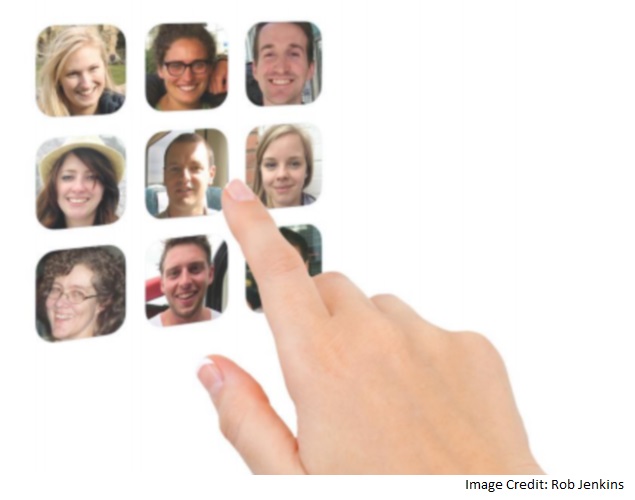- Home
- Internet
- Internet News
- Facelock Makes Your Friends' Faces Your Password
Facelock Makes Your Friends' Faces Your Password

Decades of psychological research has found that humans can recognise familiar faces across a wide range of images, even when their image quality is poor.
In contrast, recognition of unfamiliar faces is tied to a specific image - so much so that different photos of the same unfamiliar face are often thought to be different people.
The new system, called Facelock, exploits this psychological effect to create a new type of authentication system whose details are published in the journal PeerJ.
Familiarity with a particular face determines a person's ability to identify it across different photographs and as a result a set of faces that are known only to a single individual can be used to create a personalised 'lock'.
Access is then granted to anyone who demonstrates recognition of the faces across images, and denied to anyone who does not.
To register with the system, users nominate a set of faces that are well known to them, but are not well known to other people. The researchers found that it was surprisingly easy to generate faces that have this property.
For example, a favourite jazz trombonist, or a revered poker player are more than suitable - effectively one person's idol is another person's stranger.
By combining faces from across a user's domains of familiarity - say, music and sports - the researchers were able to create a set of faces that were known to that user only. To know all of those faces is then the key to Facelock.
The 'lock' consists of a series of face grids and each grid is constructed so that one face is familiar to the user, whilst all other faces are unfamiliar.
Authentication is a matter of simply touching the familiar face in each grid. For the legitimate user, this is a trivial task, as the familiar face stands out from the others.
However, a fraudster looking at the same grid hits a problem - none of the faces stand out.
Building authentication around familiarity has several advantages. Unlike password or PIN-based systems, a familiarity-based approach never requires users to commit anything to memory.
Nor does it require them to name the faces in order to authenticate. The only requirement is to indicate which face looks familiar.
Lead author, Dr. Rob Jenkins of the University of York in the UK, said that "pretending to know a face that you don't know is like pretending to know a language that you don't know - it just doesn't work. The only system that can reliably recognise faces is a human who is familiar with the faces concerned."
Catch the latest from the Consumer Electronics Show on Gadgets 360, at our CES 2026 hub.
- Samsung Galaxy Unpacked 2025
- ChatGPT
- Redmi Note 14 Pro+
- iPhone 16
- Apple Vision Pro
- Oneplus 12
- OnePlus Nord CE 3 Lite 5G
- iPhone 13
- Xiaomi 14 Pro
- Oppo Find N3
- Tecno Spark Go (2023)
- Realme V30
- Best Phones Under 25000
- Samsung Galaxy S24 Series
- Cryptocurrency
- iQoo 12
- Samsung Galaxy S24 Ultra
- Giottus
- Samsung Galaxy Z Flip 5
- Apple 'Scary Fast'
- Housefull 5
- GoPro Hero 12 Black Review
- Invincible Season 2
- JioGlass
- HD Ready TV
- Laptop Under 50000
- Smartwatch Under 10000
- Latest Mobile Phones
- Compare Phones
- OPPO Reno 15 Pro Max
- Honor Win RT
- Honor Win
- Xiaomi 17 Ultra Leica Edition
- Xiaomi 17 Ultra
- Huawei Nova 15
- Huawei Nova 15 Pro
- Huawei Nova 15 Ultra
- Asus ProArt P16
- MacBook Pro 14-inch (M5, 2025)
- OPPO Pad Air 5
- Huawei MatePad 11.5 (2026)
- Xiaomi Watch 5
- Huawei Watch 10th Anniversary Edition
- Acerpure Nitro Z Series 100-inch QLED TV
- Samsung 43 Inch LED Ultra HD (4K) Smart TV (UA43UE81AFULXL)
- Asus ROG Ally
- Nintendo Switch Lite
- Haier 1.6 Ton 5 Star Inverter Split AC (HSU19G-MZAID5BN-INV)
- Haier 1.6 Ton 5 Star Inverter Split AC (HSU19G-MZAIM5BN-INV)












